Intro
Discover key facts about Fecal Occult Blood, including testing, symptoms, and colon cancer screening, to understand the importance of early detection and prevention methods.
The importance of screening for various health conditions cannot be overstated, and one crucial aspect of this is the detection of fecal occult blood. Fecal occult blood refers to the presence of blood in the stool that is not visible to the naked eye. This condition can be indicative of several underlying health issues, ranging from minor problems like hemorrhoids to more serious conditions such as colorectal cancer. Understanding the implications and facts surrounding fecal occult blood is essential for maintaining good health and recognizing when medical intervention is necessary.
Detecting fecal occult blood is a critical step in preventive healthcare, especially for individuals at higher risk of gastrointestinal diseases. The process involves a simple test that can be performed at home or in a clinical setting, making it accessible to a wide range of people. Despite its simplicity, the test provides valuable insights into the health of the gastrointestinal tract, highlighting potential issues before they become severe. The significance of fecal occult blood testing lies in its ability to prompt early intervention, which can significantly improve outcomes for patients.
The awareness and understanding of fecal occult blood are not as widespread as they should be, given the importance of this health indicator. Many individuals are unaware of the risks associated with ignoring the presence of fecal occult blood or the benefits of regular screening. Education on this topic can empower people to take control of their health, recognizing the signs that may indicate a need for medical evaluation. By delving into the specifics of fecal occult blood, including its causes, detection methods, and the implications of test results, individuals can better navigate the healthcare system and make informed decisions about their well-being.
Introduction to Fecal Occult Blood Testing
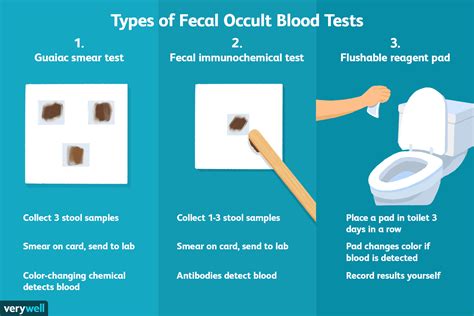
Types of Fecal Occult Blood Tests
The choice between different fecal occult blood tests depends on several factors, including the patient's risk factors, the suspected cause of bleeding, and the availability of testing materials. Guaiac-based tests are traditional and widely used, relying on a chemical reaction to detect hemoglobin. Immunochemical tests, on the other hand, use antibodies to detect human hemoglobin specifically, offering higher sensitivity and specificity. Understanding the differences between these tests can help healthcare providers select the most appropriate screening tool for their patients.Clinical Significance of Fecal Occult Blood
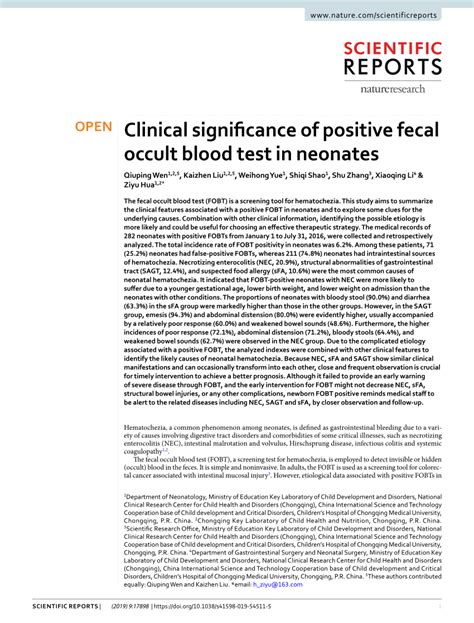
Colorectal Cancer Screening Guidelines
Guidelines for colorectal cancer screening, including the use of fecal occult blood tests, are established by various health organizations. These guidelines typically recommend regular screening for individuals of average risk starting at the age of 50, although this may be adjusted based on individual risk factors. High-risk individuals, such as those with a family history of colorectal cancer or certain genetic syndromes, may need to start screening earlier and undergo more frequent testing. Adherence to these guidelines can help in the early detection and prevention of colorectal cancer.Fecal Occult Blood Test Procedure
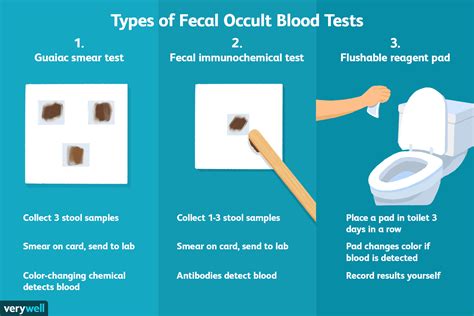
Interpreting Fecal Occult Blood Test Results
Interpreting the results of a fecal occult blood test is relatively straightforward. A positive result indicates the presence of blood in the stool, which necessitates further evaluation to determine the source of bleeding. This may involve additional tests such as colonoscopy, sigmoidoscopy, or barium enema. A negative result suggests that no blood was detected, but it does not entirely rule out the possibility of gastrointestinal bleeding or underlying conditions. Repeat testing may be recommended, especially if symptoms persist or if there are other indications of gastrointestinal disease.Benefits and Limitations of Fecal Occult Blood Testing
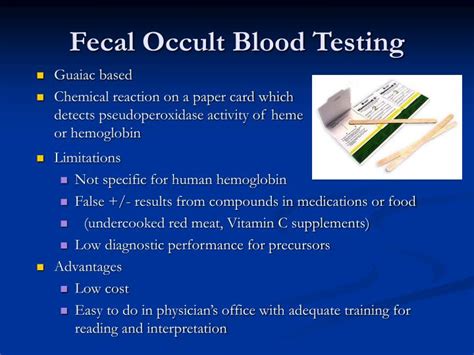
Future Directions in Fecal Occult Blood Testing
Advancements in technology and medical research are continually improving the field of fecal occult blood testing. New methods and materials are being developed to enhance the sensitivity and specificity of these tests, potentially allowing for earlier and more accurate detection of gastrointestinal diseases. Additionally, there is a growing interest in combining fecal occult blood testing with other screening modalities to create comprehensive and effective screening programs for colorectal cancer and other conditions.Common Causes of Fecal Occult Blood
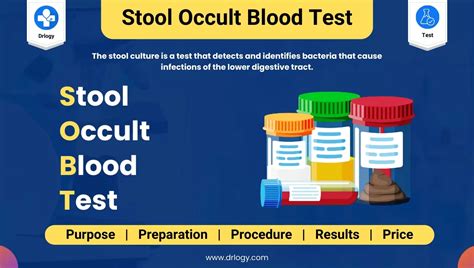
Management and Treatment of Underlying Conditions
The management and treatment of conditions associated with fecal occult blood depend on the underlying cause. For example, hemorrhoids may be managed with lifestyle modifications and topical treatments, while colon polyps may require removal during a colonoscopy. In the case of colorectal cancer, treatment options can include surgery, chemotherapy, radiation therapy, or a combination of these, depending on the stage and location of the cancer. Early detection through fecal occult blood testing can significantly influence the choice of treatment and the prognosis.Role of Fecal Occult Blood Testing in Preventive Healthcare
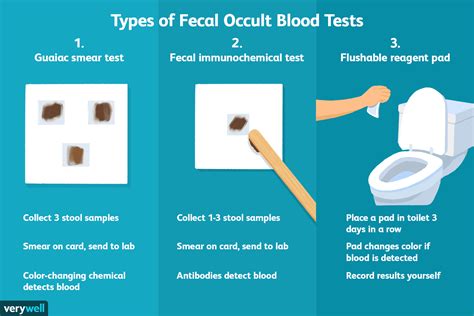
Public Health Implications
The public health implications of fecal occult blood testing are significant. Widespread adoption of regular screening can lead to a decrease in the incidence of colorectal cancer, as well as a reduction in healthcare costs associated with the treatment of advanced disease. Public awareness campaigns and educational programs are essential for promoting the importance of fecal occult blood testing and encouraging individuals to participate in screening programs. By working together, healthcare providers, policymakers, and the general public can make a substantial impact on the prevention and early detection of colorectal cancer and other gastrointestinal diseases.Conclusion and Future Perspectives

Final Thoughts
The importance of fecal occult blood testing cannot be overstated. By understanding the facts surrounding this test and its implications for health, individuals can take proactive steps towards maintaining their well-being and reducing the risk of serious diseases. As the medical community continues to learn more about gastrointestinal health and the role of screening in disease prevention, the significance of fecal occult blood testing will only continue to grow.What is fecal occult blood testing used for?
+Fecal occult blood testing is used to detect hidden blood in the stool, which can be an indicator of gastrointestinal bleeding and underlying conditions such as ulcers, colon polyps, and colorectal cancer.
How is a fecal occult blood test performed?
+The test involves collecting stool samples using a provided kit and returning them to a healthcare provider or laboratory for analysis. The samples are tested for the presence of hemoglobin, indicating blood in the stool.
What are the benefits of fecal occult blood testing?
+The benefits include early detection of colorectal cancer and its precursors, non-invasive nature, simplicity, and the potential to reduce morbidity and mortality associated with gastrointestinal diseases.
What are the limitations of fecal occult blood testing?
+The limitations include the potential for false-positive and false-negative results, and the test may not detect all sources of gastrointestinal bleeding. Understanding these limitations is crucial for appropriate interpretation of test results.
Why is it important to follow screening guidelines for fecal occult blood testing?
+Following screening guidelines is essential for the early detection and prevention of colorectal cancer and other gastrointestinal diseases. Regular screening can lead to timely intervention, significantly improving outcomes for patients.
We invite you to share your thoughts and experiences with fecal occult blood testing in the comments below. If you found this article informative, please consider sharing it with others who may benefit from this knowledge. Together, we can promote awareness and encourage proactive steps towards better health and wellness.
